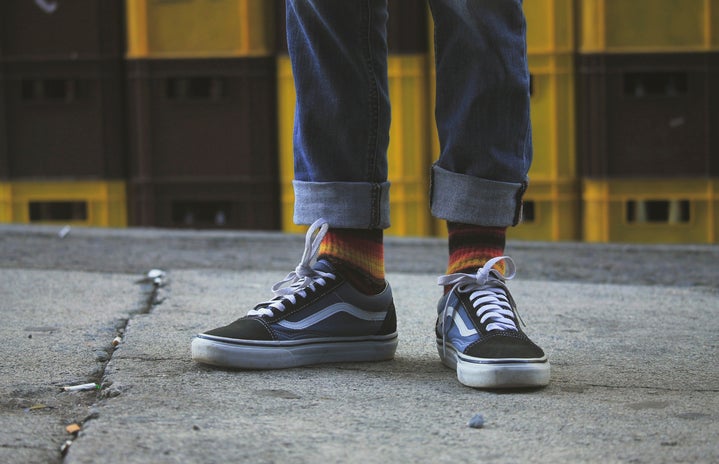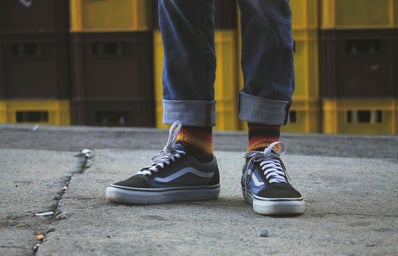Fashion is a passion for many collegiettes. There are tons of reasons why we love it so much. Along with style, fashion gives us a sense of individuality and a way to express ourselves to the world.
A major downside to fashion for many can be its prices, especially those who aren’t college-fund friendly. Nowadays though, more and more clothing stores are featuring the latest styles at affordable prices, and their fashions switch out so often that it seems easier than ever to stay on top of current trends. This practice, known as fast fashion, sounds like a good thing, right? Let’s break down why it’s most definitely not.
Fast fashion makes it possible for the latest trends to quickly appear in stores, but at the cost of damaging the planet. The practice is driven primarily by need rather than desire — it’s designed to swiftly replace clothing, and its emphasis on speed causes the styles of clothing produced to be of poor or cheap quality. As such, fast fashion doesn’t generate investment pieces, and consumers often have to replace them with the next “it” styles only months later. This process is causing a rapid increase in textile waste internationally. Specifically in the United States, according to Forbes, “Only 10 percent of donated clothes get resold. The rest floods landfills — we send 13 trillion tons of our clothes to landfills in the U.S. alone where they sit for 200 years leaving toxic chemicals and dyes to contaminate local soil and groundwater.”
This environmental problem is predicted to worsen if the practice of fast fashion continues in the industry. Forbes further reports that “the fashion industry’s CO2 emissions are projected to increase by more than 60 percent to nearly 2.8 billion tons per year by 2030. Main cotton producing countries like China and India are already facing water shortages, and with water consumption projected to go up 50 percent by 2030, these cotton-growing nations face the dilemma of choosing between cotton production and securing clean drinking water.” This report confirms that fast fashion is already starting to negatively impact the planet’s accessibility to clean water. The predictions of its future impact on the world’s water supply indicates that the practice will cause damaging, long-term consequences for the planet and the human race.
And friendly reminder that humans can’t survive without water — it’s essential to life and everyone has a right to access it. This is a serious problem that’s directly related to us and one that will negatively affect our health as well as the planet’s if not addressed ASAP.
So what can we do about the issue? In truth, a lot more than we realize. Some collegiettes may be thinking that there’s not much we can do about fast fashion because we’re not the ones creating it. In fact, we’re actually partly responsible for the problem, along with the fashion industry. By continuing to buy cheap, trendy pieces from retail stores, we’re engaging in the practice of fast fashion and handing companies our approval to continue mass-producing garments through destructive practices.
We have power as consumers to help induce change in the industry through sustainable fashion. Green Strategy, a consulting firm that supports the efforts of companies in the fashion industry regarding sustainability, defines sustainable fashion as “clothing, shoes and accessories that are manufactured, marketed and used in the most sustainable manner possible, taking into account both environmental and socio-economic aspects.”
The practice of sustainable fashion requires for all stages of the product’s life cycle to be continuously improved to prevent further environmental damage. By this, companies committed to being sustainable improve their design, production, and transportation of clothing processes to ensure that their work doesn’t negatively impact the planet. Efforts to be more sustainable can also be made by us collegiettes: we can support the planet by encouraging ourselves and our friends and family to actively purchase clothes that are sustainable investment pieces rather than the quickly produced trends.
This idea may raise concerns from some, as investment pieces are traditionally known to be expensive. Fortunately for us, there are tons of companies within the fashion industry that are committed to providing sustainable fashion and will do so at a cost that’s considerate of college students’ budgets. ThreadUP, a clothing company that serves as the world’s largest online marketplace to buy and sell women’s and kids’ secondhand clothes, aims to offer clothing that satisfies shoppers’ individual style needs in a way that environmentally supports the planet. The company achieves this by reselling gently used, like-new condition clothing — from brands like Banana Republic to Gucci — at up to 90 percent off. This allows shoppers to purchase pieces in a way they feel good about — and at amazingly affordable prices. You can check out these brands and others that practice sustainability here.
In addition to offering affordable sustainable fashions, ThreadUP goes above and beyond to educate shoppers on why it’s important to know the brands and materials they purchase. On their website, ThreadUP features resale reports released annually which capture the explosive growth of apparel resale in the industry (head here to learn more). The reports also explores how the success of resale over retail demonstrates the ill effects of Fast Fashion and what millennials and other generational shoppers can do to further promote sustainability.
Currently ThreadUP is supporting our fellow collegiettes’ sustainability efforts at UMass by sponsoring Sisters on the Runway (SOTR). The student run organization is preparing for its upcoming 8th Annual Benefit Fashion Show on April 7th, and the show’s proceeds will benefit domestic violence survivors in Northampton.
In addition to raising awareness to the issue of domestic abuse, the members of Sisters on the Runway also work to promote fashion sustainability through the show. SOTR’s fashion directors, for example, contact secondhand clothing companies like ThreadUP to ask for clothing donations for the show, and these pieces are sold after the show to guests at affordable prices. This allows collegiettes to purchase stylish sustainable fashion pieces all while benefiting Safe Passage, a domestic violence victim shelter. SOTR’s other sustainable efforts include constructing sustainable clothes for models to wear on the runway, and recycling and reusing older fashion pieces from years past in new shows.
The combined efforts of Sisters on the Runway and ThreadUP show that college students and the fashion industry can work together to promote sustainability in our communities. Our fellow collegiettes have begun to take a stand against the problem of fast fashion, and I hope that we are all inspired to become more sustainable. Collegiettes can support fashion sustainability in numerous ways, including attending the upcoming SOTR fashion show and actively purchasing secondhand and investment fashion pieces. I encourage everyone to support fashion sustainability in whatever way they can, and know that your efforts greatly contribute to supporting the health of our planet and our communities.
Photos: 1, 2, 3, 4 courtesy of author, 5 courtesy of Sisters on the Runway UMass Division


